Continuing on, here are losses six through ten:
Dana Corp
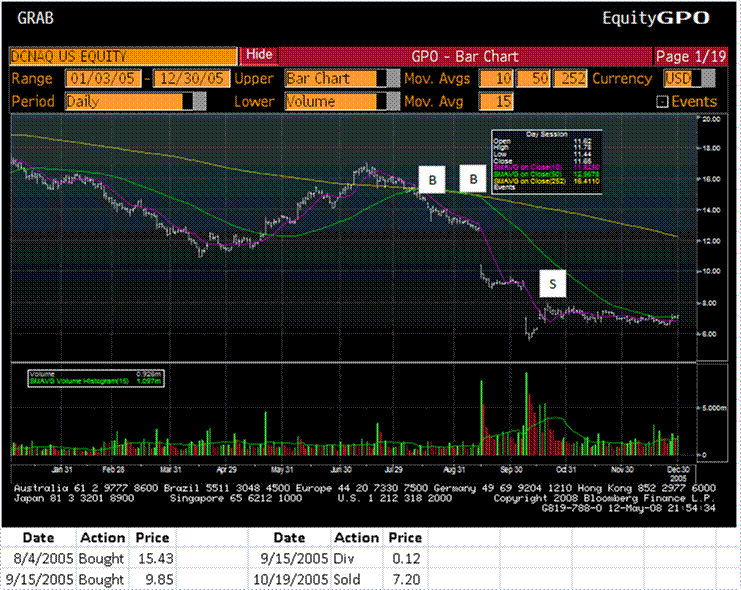
In some ways, this one was pure slop on my part.? In September 2005, I thought the setback in Dana’s auto parts business was temporary, and bought a little more.? After the second dose of bad news, I looked at the statements afresh and kicked myself.? How could I have missed the growing negative divergence between earnings and cash flow?? I waited a few days for a rally, and sold.? As it was, Dana filed for Chapter 11 in March 2006.? This could have been a lot worse for me.
| David Merkel | ||
| Dana Files Chapter 11 | ||
| 3/3/2006 2:19 PM EST |
How much can you lose on a $7 stock? Seven dollars. Dana (DCN:NYSE) just filed for bankruptcy, and trading is temporarily suspended. I think the common will get wiped out, so any long trades here are purely speculative. Unsecured debt is trading in the high $60s, so they look like they are the new owners of the company (but that’s just a guess).
Just another reason to not be afraid to take losses when you make a mistake. Same for PXRE Group (PXT:NYSE), which has continued to fall since my sales.
Don’t be afraid to take losses, if you know the situation is worse than the current price would indicate.
The common was wiped out when Dana recently emerged from bankruptcy in February of this year.? PXRE made out better, merging with Argonaut.
National Atlantic Holdings
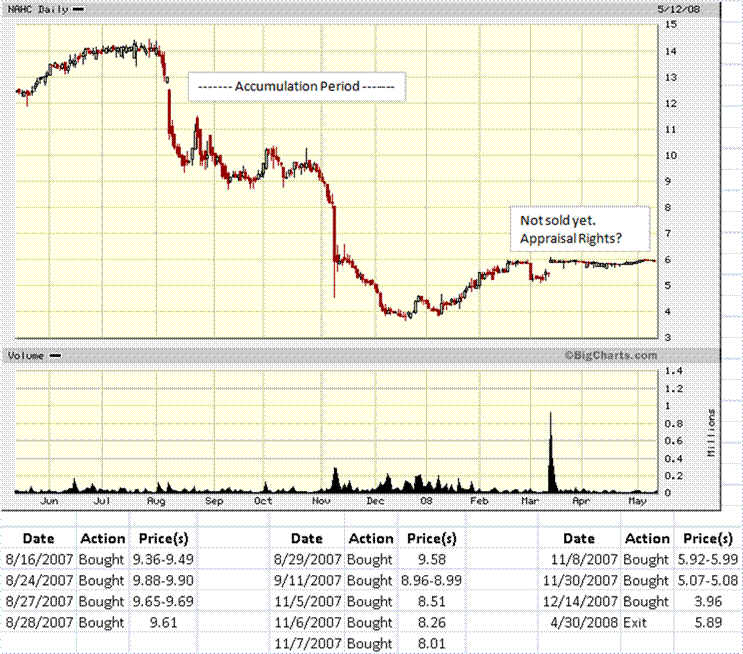
I’ve written more than my share on NAHC, and for the good of my readers, probably too much.? Perhaps this one might be a good example of taking time to accumulate a position.? My average cost is $6.67, which means that if the deal goes through at $6.25, this isn’t one of my ten largest losses.? Tentatively, though, I plan on filing for appraisal rights if the deal goes through.
Consider the 1Q08 earnings conference call on Monday:
Operator:
And we have a follow up from David Merkel with Finacorp Securities.<Q – David Merkel>: Hi.? Sorry to trouble you, one follow up. It’s basically the questions I asked on the last call.? Your loss reserves, there’s nothing there in terms of future development that should have been reflected in the first quarter that isn’t there in the statements, and your bonds are stated at their fair market value to the best of your knowledge.? You’ve got a high-quality portfolio there.<A – Frank Prudente>: Yes we do, David.? This is Frank Prudente. I’ll take the second part of your question first if you don’t mind.? Our portfolio remains to be very conservative and very high quality.? With the implementation of the new accounting standard we’re at Level 2 two for all of our available for sale securities.? So we continue to feel very comfortable about our investment portfolio.? And as Bruce alluded to earlier, we do a comprehensive actuarial analysis every quarter which is further validated by the review performed by our external auditors each and every quarter.? And what I can tell you is we base our estimates of loss and loss adjustment expense reserves based on all of the most relevant data we have available to us for each and every financial statement close process.<Q – David Merkel>: Thanks, Frank. I appreciate that. Take care.
Vishay Intertechnology
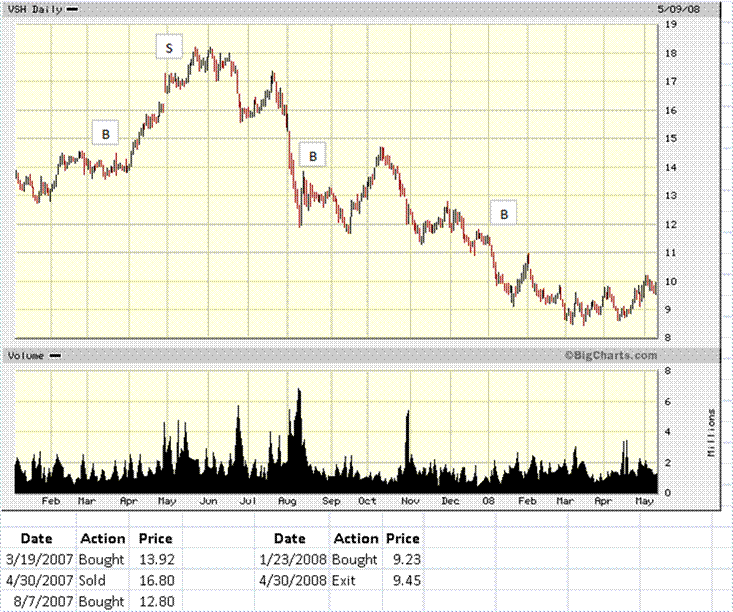
I am still invested in Vishay.? It earns money, generates free cash flow, debt is being reduced, and the balance sheet looks decent.? The sorts of electronic components that they make will be difficult to make obsolete.? I still like the name; I don’t think this one will be a loss for me in the end.
Tellabs
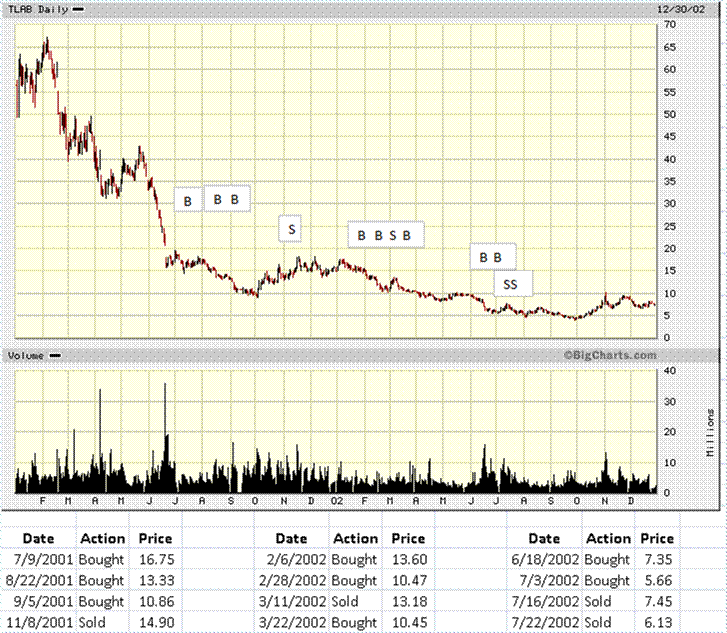
Tellabs looked cheap and got cheaper.? Almost every small tech company was getting thrown out; valuations reached record low levels by the end of third quarter 2002.? Tellabs had disappointment after disappointment, and I concluded that if it couldn’t earn money, the book value was overstated.? I sold, and bought stocks that I thought have more promise.
That said, my rebalancing discipline allowed me to reduce the overall losses from this volatile stock.? I didn’t lose nearly as much as a buy-and-hold investor would have.
Deutsche Bank
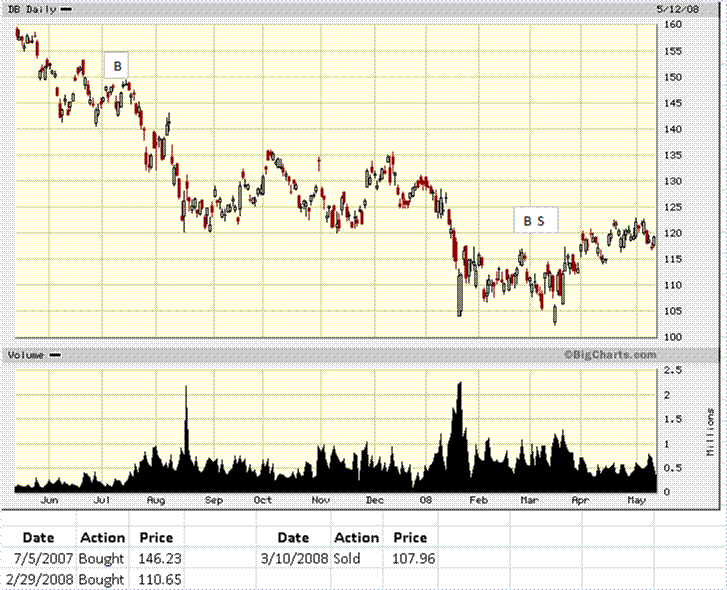
This was a failure to integrate my overall markets view, and allowing short-term valuation issues to dominate my decision.? I thought the investment banks wouldn’t do well, but I thought Deutsche Bank might escape the troubles.? Well, I was wrong.? European institutions mimicked Wall Street to a higher degree than most would have expected.
My last buy was a rebalancing buy, but as results came in from other European banks, I ended up selling Deutsche Bank, and RBS as well.? Time will tell how smart that was… the investment banks of our world are tied together through counterparty exposure — to a degree, they succeed and fail as a group… that’s why the Fed bailed out Bear Stearns.
Summary of Part II
I’ll repeat what I said in part one, and add a little.
- Don?t play with companies that have moderate credit quality during times of economic stress.
- Measure credit quality not only by the balance sheet, but by the ability to generate free cash.
- Spend more time trying to see whether management teams are competent or not.
- Cut losses when your estimate of future profitability drops to levels that no longer justify holding the asset.
The next two articles in this series will be about investments that went right.? They should come soon.
Full disclosure: long NAHC VSH

Great posts.
Been there, done that. We all have.
My biggest mistakes have been in not recognizing when things have truly gotten worse for the company.
I don’t believe in stop losses, but I almost never hang on to something when I’ve taken more than a 10-12% loss. There are too many other good possibilities out there. If I’m wrong, or early, or whatever, I’m gone…
Hanging on to something through a 70% drop is just insane.